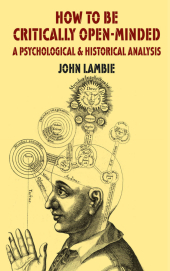 Neuerscheinungen 2014Stand: 2020-02-01 |
Schnellsuche
ISBN/Stichwort/Autor
|
Herderstraße 10
10625 Berlin
Tel.: 030 315 714 16
Fax 030 315 714 14
info@buchspektrum.de |

J. Lambie
How to be Critically Open-Minded: A Psychological and Historical Analysis
1st ed. 2014. 2014. xiii, 239 S. 216 mm
Verlag/Jahr: SPRINGER PALGRAVE MACMILLAN; PALGRAVE MACMILLAN UK 2014
ISBN: 1-349-45338-2 (1349453382)
Neue ISBN: 978-1-349-45338-2 (9781349453382)
Preis und Lieferzeit: Bitte klicken
In a lively and subversive analysis, psychologist John Lambie explains how to see another person´s point of view while remaining critical - in other words how to be ´critically open-minded´. Using entertaining examples from history and psychology, Lambie explores the implications of critical open-mindedness for scientific and moral progress.
Preface 1. How is Human Progress Possible? PART I: CRITICAL OPEN MINDEDNESS: WHAT IS IT? 2. Introducing Critical Open Mindedness 3. Case Study I: Open and Closed Minds - Erasmus v. Luther 4. Previous Approaches to Open Mindedness: From Socrates to Present 5. Summary of the New Model PART II: CRITICAL OPEN MINDEDNESS: WHAT IS IT GOOD FOR? 6. Decision Making, Morality and Well Being 7. Case Study II: Morality -The Levellers and Religious Toleration 8. Case Study III: Science-Galileo and Critical Perspective-Shifting PART III: CRITICAL OPEN MINDEDNESS: WHAT UNDERPINS IT? 9. A History of Open and Closed Societies 10. Psychological amd Biological Roots of Open-Mindedness 11. Case Study IV: Sound Self-Awareness - Jane Austen v. Joseph Stalin PART IV: CONCLUSIONS AND IMPLICATIONS 12. Defending and Cultivating Critical Open Mindedness 13. Open-Mindedness, Science and Religion 14. Summary and Conclusion
"In this wide-ranging study, John Lambie combines insights from psychology with memorable historical examples to engage the reader in a thought-provoking exploration of open-mindedness and its role in moral decision-making and the search for knowledge." - William Hare, Mount Saint Vincent University, Canada
John Lambie is currently Reader in Psychology at Anglia Ruskin University, UK, and is an Associate Fellow of the British Psychological Society. His primary research focus is on the awareness of emotion.


